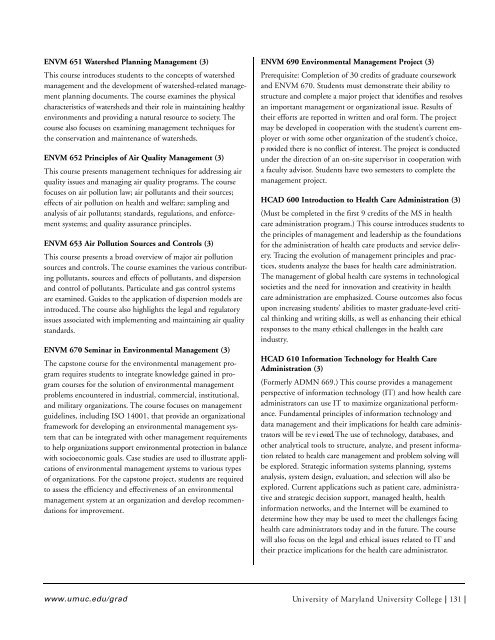A+B. Intro_SJ.1 - University of Maryland University College
A+B. Intro_SJ.1 - University of Maryland University College
A+B. Intro_SJ.1 - University of Maryland University College
Create successful ePaper yourself
Turn your PDF publications into a flip-book with our unique Google optimized e-Paper software.
ENVM 651 Watershed Planning Management (3)<br />
This course introduces students to the concepts <strong>of</strong> watershed<br />
management and the development <strong>of</strong> watershed-related management<br />
planning documents. The course examines the physical<br />
characteristics <strong>of</strong> watersheds and their role in maintaining healthy<br />
environments and providing a natural re s o u rce to society. T h e<br />
course also focuses on examining management techniques for<br />
the conservation and maintenance <strong>of</strong> watersheds.<br />
ENVM 652 Principles <strong>of</strong> Air Quality Management (3)<br />
This course presents management techniques for addressing air<br />
quality issues and managing air quality programs. The course<br />
focuses on air pollution law; air pollutants and their sources;<br />
effects <strong>of</strong> air pollution on health and welfare; sampling and<br />
analysis <strong>of</strong> air pollutants; standards, regulations, and enforcement<br />
systems; and quality assurance principles.<br />
ENVM 653 Air Pollution Sources and Controls (3)<br />
This course presents a broad overview <strong>of</strong> major air pollution<br />
sources and controls. The course examines the various contributing<br />
pollutants, sources and effects <strong>of</strong> pollutants, and dispersion<br />
and control <strong>of</strong> pollutants. Particulate and gas control systems<br />
are examined. Guides to the application <strong>of</strong> dispersion models are<br />
introduced. The course also highlights the legal and regulatory<br />
issues associated with implementing and maintaining air quality<br />
standards.<br />
ENVM 670 Seminar in Environmental Management (3)<br />
The capstone course for the environmental management program<br />
requires students to integrate knowledge gained in program<br />
courses for the solution <strong>of</strong> environmental management<br />
problems encountered in industrial, commercial, institutional,<br />
and military organizations. The course focuses on management<br />
guidelines, including ISO 14001, that provide an organizational<br />
framework for developing an environmental management system<br />
that can be integrated with other management requirements<br />
to help organizations support environmental protection in balance<br />
with socioeconomic goals. Case studies are used to illustrate applications<br />
<strong>of</strong> environmental management systems to various types<br />
<strong>of</strong> organizations. For the capstone project, students are required<br />
to assess the efficiency and effectiveness <strong>of</strong> an environmental<br />
management system at an organization and develop recommendations<br />
for improvement.<br />
ENVM 690 Environmental Management Project (3)<br />
Prerequisite: Completion <strong>of</strong> 30 credits <strong>of</strong> graduate coursework<br />
and ENVM 670. Students must demonstrate their ability to<br />
s t ru c t u re and complete a major project that identifies and re s o l ve s<br />
an important management or organizational issue. Results <strong>of</strong><br />
their efforts are reported in written and oral form. The project<br />
may be developed in cooperation with the student’s current employer<br />
or with some other organization <strong>of</strong> the student’s choice,<br />
p rovided there is no conflict <strong>of</strong> interest. The project is conducted<br />
under the direction <strong>of</strong> an on-site supervisor in cooperation with<br />
a faculty advisor. Students have two semesters to complete the<br />
management project.<br />
HCAD 600 <strong>Intro</strong>duction to Health Care Administration (3)<br />
(Must be completed in the first 9 credits <strong>of</strong> the MS in health<br />
care administration program.) This course introduces students to<br />
the principles <strong>of</strong> management and leadership as the foundations<br />
for the administration <strong>of</strong> health care products and service delivery.<br />
Tracing the evolution <strong>of</strong> management principles and practices,<br />
students analyze the bases for health care administration.<br />
The management <strong>of</strong> global health care systems in technological<br />
societies and the need for innovation and creativity in health<br />
care administration are emphasized. Course outcomes also focus<br />
upon increasing students’ abilities to master graduate-level critical<br />
thinking and writing skills, as well as enhancing their ethical<br />
responses to the many ethical challenges in the health care<br />
industry.<br />
HCAD 610 Information Technology for Health Care<br />
Administration (3)<br />
(Formerly ADMN 669.) This course provides a management<br />
perspective <strong>of</strong> information technology (IT) and how health care<br />
administrators can use IT to maximize organizational performance.<br />
Fundamental principles <strong>of</strong> information technology and<br />
data management and their implications for health care administrators<br />
will be re v i ewed. The use <strong>of</strong> technology, databases, and<br />
other analytical tools to structure, analyze, and present information<br />
related to health care management and problem solving will<br />
be explored. Strategic information systems planning, systems<br />
analysis, system design, evaluation, and selection will also be<br />
explored. Current applications such as patient care, administrative<br />
and strategic decision support, managed health, health<br />
information networks, and the Internet will be examined to<br />
determine how they may be used to meet the challenges facing<br />
health care administrators today and in the future. The course<br />
will also focus on the legal and ethical issues related to IT and<br />
their practice implications for the health care administrator.<br />
w w w. u m u c . e d u / g r a d<br />
Un i versity <strong>of</strong> Ma r yland Un i versity <strong>College</strong> | 131 |

















